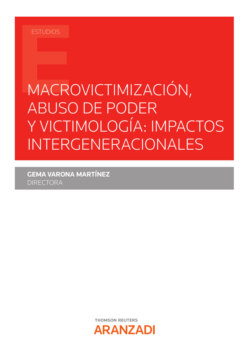Читать книгу Macrovictimización, abuso de poder y victimología: impactos intergeneracionales - Gema Varona Martínez - Страница 12
На сайте Литреса книга снята с продажи.
1. Protection of and assistance to direct victims of terrorism 1.1. A specific status and treatment for victims of terrorism
ОглавлениеDirect victims of terrorism are subject to several provisions and instruments aimed at improving the protection of their rights, regardless of their nationality or the arrest of the perpetrator of the terrorist act25. The question of the need to provide specific status and treatment for victims of terrorism has been subject to several discussions within the Council of Europe. During the High-Level Seminar on “Protecting human rights while fighting terrorism”26 organized by the Council of Europe in June 2005, many participants noted that the specificity of terrorism stems from the fact that direct victims are targeted on behalf of the community. In such perspective, the community –represented by the state– would have a greater duty of solidarity towards victims of terrorism, requiring specific assistance measures that go beyond material compensation27.
Even though the Guidelines on the protection of victims of terrorist acts (adopted in 200528 and revised in 201729) have been presented as responding to this need for a special approach for victims of terrorism30, it should be noted that these Guidelines largely reflect the existing instruments relating to the protection of crime victims. Apart from additional provisions regarding emergency assistance and media regulation, the Guidelines contain provisions very similar to those provided for in the 2006 Recommendation of the Committee of Ministers on assistance to crime victims31. In this respect, the explanatory memorandum of this Recommendation states that even though some countries have given priority to terrorist acts, the needs of victims of these acts are essentially the same as those of victims of other crimes”32.
A similar position is adopted by the Group of Specialists on remedies for crime victims of the Council of Europe (CJ-S-VICT) who considers that “the essential needs of victims of terrorism do not significantly differ from the needs of other victims of crimes: whether they are personally injured or whether their property is damaged, the result is the same irrespective of the motivation of criminals for their harmful conduct”33. Nevertheless, the CJ-S-VICT emphasizes that certain aspects of terrorist victimization require special attention (e.g. mass victimization, specific intent of terrorist attacks).
The Group of Specialists on Assistance to Victims and Prevention of Repeat Victimisation (PC-S-AV) also considers that, over all, victims of terrorism should be considered and treated as victims in general34. However, the Group recognizes that terrorism victimization is characterized by a series of specific features (e.g. the special responsibility and duty of solidarity of the community towards them as they are targeted on behalf of the community35, the fact that terrorist perpetrators are rarely subject to criminal trial, which requires an effective compensation system that allows rapid intervention outside the criminal justice system36).
